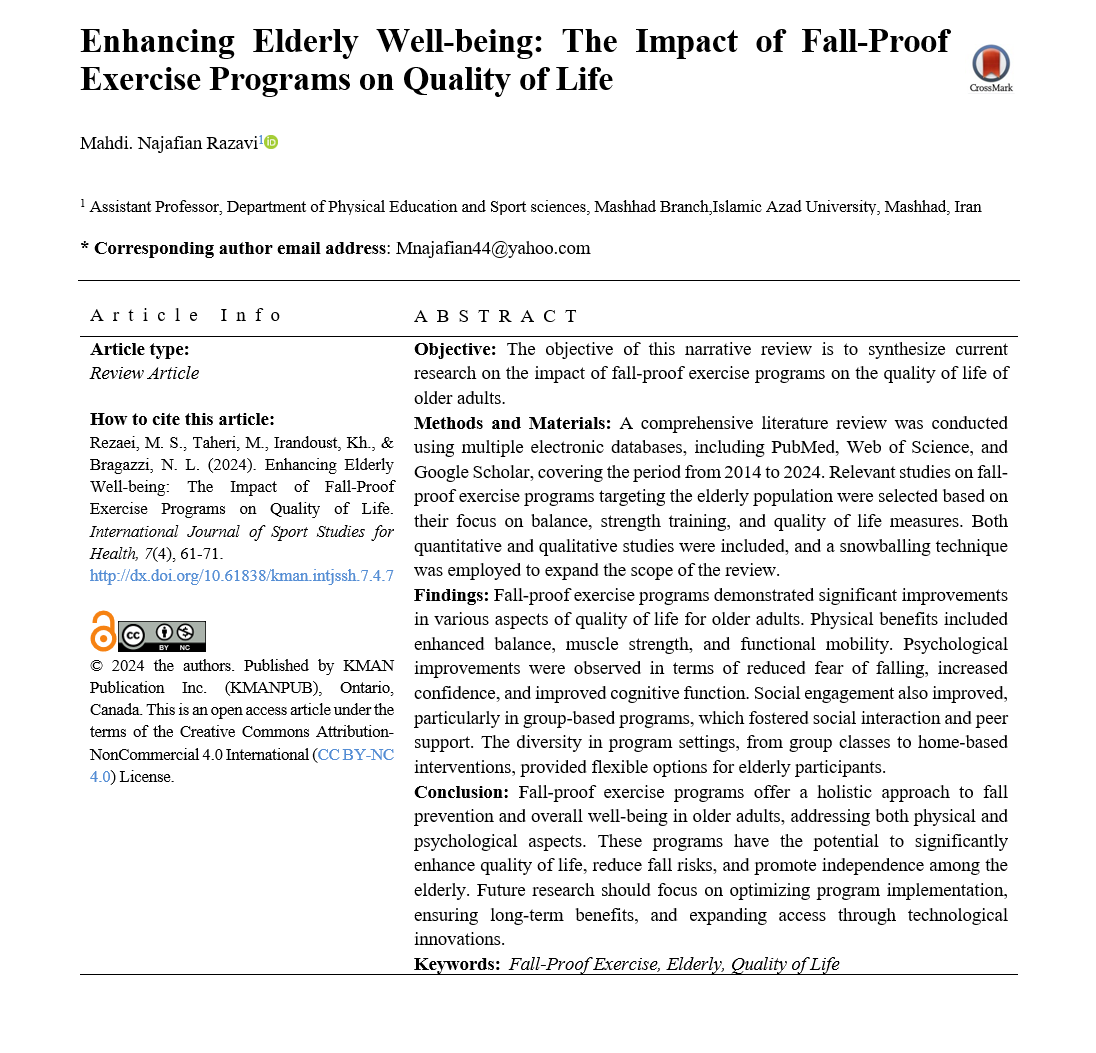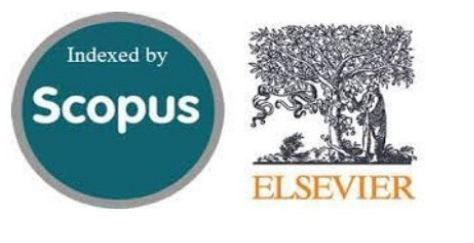Enhancing Elderly Well-being: The Impact of Fall-Proof Exercise Programs on Quality of Life
Keywords:
Fall-Proof Exercise, Elderly, Quality of LifeAbstract
Objective: The objective of this narrative review is to synthesize current research on the impact of fall-proof exercise programs on the quality of life of older adults.
Methods and Materials: A comprehensive literature review was conducted using multiple electronic databases, including PubMed, Web of Science, and Google Scholar, covering the period from 2014 to 2024. Relevant studies on fall-proof exercise programs targeting the elderly population were selected based on their focus on balance, strength training, and quality of life measures. Both quantitative and qualitative studies were included, and a snowballing technique was employed to expand the scope of the review.
Findings: Fall-proof exercise programs demonstrated significant improvements in various aspects of quality of life for older adults. Physical benefits included enhanced balance, muscle strength, and functional mobility. Psychological improvements were observed in terms of reduced fear of falling, increased confidence, and improved cognitive function. Social engagement also improved, particularly in group-based programs, which fostered social interaction and peer support. The diversity in program settings, from group classes to home-based interventions, provided flexible options for elderly participants.
Conclusion: Fall-proof exercise programs offer a holistic approach to fall prevention and overall well-being in older adults, addressing both physical and psychological aspects. These programs have the potential to significantly enhance quality of life, reduce fall risks, and promote independence among the elderly. Future research should focus on optimizing program implementation, ensuring long-term benefits, and expanding access through technological innovations.
Downloads
References
1. Fadem SZ. Falls in the Elderly and in Persons with
Chronic Disease. Complications in Dialysis: A Clinical Guide.
Cham: Springer International Publishing; 2023. p. 311-28[DOI]
2. Hassan BAA, Soliman A, El-Sayed MS, Ahmed KS,
Abdelhakiem NM, El-Deen HAB, et al. Correlation Between
Dyspnea, Fear of Falling and Quality of Life in Geriatric
Population in Nile Delta Region, Egypt. International Journal.
2023;10(4):1628-36. [DOI]
3. Dehesh M, Rejeh N, Tadrisi SD. Fear of falling and
quality of life in older hemodialysis patients in Tehran hospitals.
Elderly Health Journal. 2024;10(1):1-6. [DOI]
4. Rajabpour P, Shojaei M, Ghasemi A, Molanorouzi K.
Effect of Group-based Fallproof Program on Balance and
Psychological Health of the Elderly With Different Ages. The
Scientific Journal of Rehabilitation Medicine. 2023;12(3):604-19.
[DOI]
5. Khazanin H, Daneshmandi H, Fakoor Rashid H. Effect
of selected fall-proof exercises on fear of falling and quality of life
in the elderly. Iranian Journal of Ageing. 2022;16(4):564-77. [DOI]
6. Mohammad Ali Nasab Firouzjah E, Farnian L. The
Effect of a Fall Proof Training on Balance and Fear of Falling in
Older Women. The Scientific Journal of Rehabilitation Medicine.
2023;11(6):988-1001. [DOI]
7. Alitabar A, Mohammad Ali Nasab Firouzjah E, Shabani
M. Comparison of the effect of Otago and Fall proof training
programs on balance, ankle proprioception and fear of falling in
elderly men with a history of falling. Studies in Sport Medicine.
2023;15(36):123-46.
8. Raeisi Z, Yasavoli SM. Effects of eight weeks fall proof
home-based exercises on balance, quality of life and fear of falling
in elderly: A randomized clinical trial. 2021:21-33.
9. Ayatizadeh Tafti F, Abedinzadeh Masuleh S, Sadeghian
Shahi MR, Maleki Nezhad H. The effect of fall-proof training on
functional capacities, working memory and Muscle strength of the
elderly with stroke. Journal of Sport and Exercise Physiology.
2023;16(2):67-79. [DOI]
10. Choi M, Ahn N, Park J, Kim K. 12-week exercise
training of knee joint and squat movement improves gait ability in
older women. International Journal of Environmental Research and
Public Health. 2021;18(4):1515. [PMID: 33562705] [PMCID:
PMC7915473] [DOI]
11. Ok HT, Joo KC, Kim WS. Relationship between Physical
Activity Level and Fall-Proof-related Fitness in Older Female
Adults. Journal of the Korean Society of Physical Medicine.
2018;13(2):1-9. [DOI]
12. Hackney ME, Hall CD, Echt KV, Wolf SL. Multimodal
exercise benefits mobility in older adults with visual impairment:
A preliminary study. Journal of Aging and Physical Activity.
2015;23(4):630-9. [PMID: 25562206] [DOI]
13. Alhamashi F, Rahnama N, Sadeghi M. Investigating the
effect of eight weeks of reactive neuromuscular training (RNT) on
body control, muscle strength and quality of life of older adults.
Studies in Sport Medicine. 2023;15(35):91-108.
14. Miri H, Haghighi M, Hosseinzadeh M, Peymani M. The
Effect of Six Weeks of Exergaming vs. Fall-proof exercises vs. on
Ankle Proprioception and Fear of Falling in-the Elderly Men.
Community Health Journal. 2021;15(1):72-84.
15. Abd Elrahman Ellsherif A, Ibrahim Ahmed A. A (healthmotor-functional) program to improve walking efficiency and
quality of life for some special groups. Beni-Suef Journal of
Physical Education and Sports Sciences (BJPESS). 2024;7(13):91-
117.
16. Bergeron S, Arnett M, Toevs S, Cirerol T, Hartung R,
Petersen L, et al. Cost benefit analysis of Idaho's fit and fall proof
program. 2017.
17. Gouveia ÉR, Gouveia BR, Marques A, Marconcin P, Ihle
A. Exercise Aging and Health: A Proposal Course for Healthcare
Professionals and Physical Activity Instructors. Geriatric Medicine
and Healthy Aging: IntechOpen; 2022
18. Post P. The effects of mastery imagery and balance
training on balance and mobility among older adults: California
State University, Fullerton; 2005.
19. Santos A. Fall Proof: The Implementation of a Virtual
Fall Prevention Program for Adults 65 and Older. 2024.
20. Merrick H. Investigation of Best Practice Standards for
Health Screening Tools Used in Physical Activity Programs for
Older Adults. 2021

Downloads
Additional Files
Published
Submitted
Revised
Accepted
Issue
Section
License
Copyright (c) 2024 Mahdi Najafian Razavi (Author)

This work is licensed under a Creative Commons Attribution-NonCommercial 4.0 International License.







